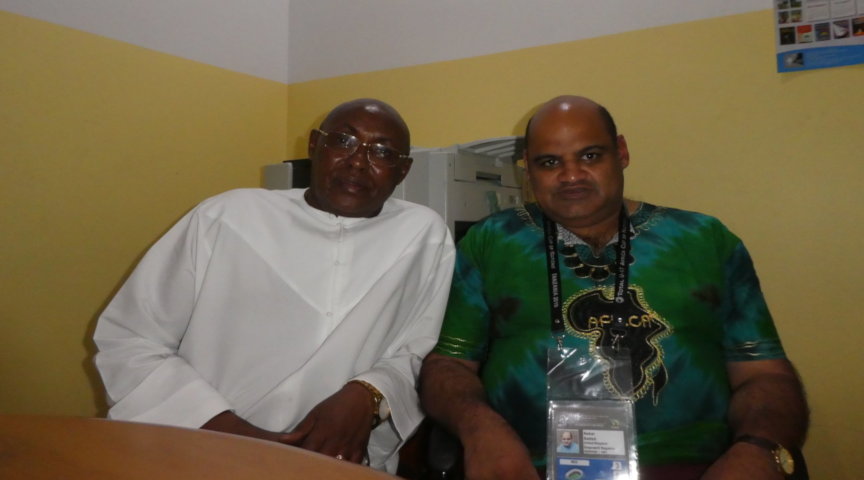The Great Sacrifice (Part Two)

The Great Sacrifice (Part One)
January 21, 2021Champions Give Notice of Intent
January 21, 2021The Great Sacrifice (Part Two)

By Satish Sekar © Satish Sekar (July 31st 2020)
What’s Missing?
The boycott of Montreal’s Olympic Games of 1976 cost Tanzania’s greatest athlete and Tanzania dear. Filbert Bayi was and remains that country’s outstanding athlete. It was his and Tanzania’s best chance of Olympic gold – the East African nation still has not a single Olympic title to its name.
But even Sir John Walker who was one of the favourites paid a price he did not deserve to pay – his victory was celebrated in New Zealand, placing him at the pinnacle of his country’s athletics pantheon along with the great Peter Snell, but his gold medal lost some of its shine as he won it.
Look at the photograph of him winning Olympic gold 44 years ago today.
What’s missing? Not a black man in sight in an era when Africans ruled the roost. Bayi was not alone in missing those games. The late Ben Jipjoh was not there either. Although most famous for aiding the great Kipchoge Keino to win Olympic gold at Jim Ryun’s expense, Jipjoh was a great athlete in his own right. He had won the 5000m at the second All-Africa Games in Lagos, Nigeria, in 1973. He set world records in the 3000m steeplechase and was outstanding in Christchurch.
Jipjoh won bronze in the 1500m at the Commonwealth Games in Christchurch 1974 – the famous race where Bayi led from start to finish, setting a new World Record when destroying a world class field that included Walker.
He also won gold medals in the 3000m steeplechase and 5000m in Christchurch. Sadly, he died a week ago, aged 77.
Grating
It’s not Walker’s fault, but it grates nonetheless. It was the unsporting act of his country supported by New Zealand’s then Prime Minister, the late Robert Muldoon, that robbed the world of African participation in Montreal’s Olympic Games.
It also helped to end the era of African domination of middle-distance running – at least for the time being.
It was caused by the weak response of the International Olympic Committee (IOC) to the shameless breach of the sports boycott of Apartheid South Africa, which had been called for by the United Nations.
African nations were enraged by the All-Blacks – a grotesque misnomer in this case – touring Apartheid South Africa before, during and after Montreal’s Olympics.
They demanded that the IOC ban New Zealand for breaching the sports boycott. The IOC lamely said it had no control over rugby and requested the Africans not to boycott the Olympics.
Outraged by the weak response and hypocrisy of the IOC over 20 African nations boycotted the Olympics – the last sports-related boycott. 1980, 1984 and 1988 suffered boycotts too. Moscow and Los Angeles were politically based boycotts that had nothing to do with sport and 1988 was an ineffective one that again had little or nothing to do with sport.
Astonishingly, very little is known of the 1976 boycott, even though it was the most successful. The African-led boycott affected the Greatest Show, made its point and showed the rest of the world that here was an effective weapon to make a point.
It was the first and last legitimate boycott in the Olympics. But why?
The Tour
Already outraged by the despicable violence of the Apartheid State, especially against children, in the Soweto Uprising, the utter insensitivity of New Zealand Rugby and its then Prime Minister, the late Robert Muldoon, just a fortnight later, was the last straw.
With the blessing of Muldoon, an All Blacks team began its controversial and shameful tour of South Africa.
Muldoon also supported the 1981 Springbok tour of New Zealand which led to civil disobedience campaigns against Apartheid in New Zealand.
Pouring fuel on a forest fire the All Blacks’ 1976 tour contained six non-white players – five Maoris (Bill Bush, Sid Going, Kent Lambert, Bill Osborne and Tane Norton[1]) and a Western Samoan (Bryan Williams) – they were given the despised ‘honorary white man status.’
The tour continued throughout and beyond the Olympics. The International Olympic Committee’s weak stance over the African demand to ban New Zealand or face a boycott wrecked Montreal’s already troubled Olympiad, especially what should have been the blue-riband event – the 1500m.
Appalled by the stance of the IOC more than 20 African boycotted the Olympic Games – some had already competed before leaving. Ironically, the staunchest ally of the anti-Apartheid struggle, Tanzania, which led the call for the boycott, paid the highest price of all.
Not only would the anticipated showdown between Walker and Bayi not take place, but the then World Record holder lost his best chance of Olympic glory.
Bayi won golds at the Commonwealth Games and All-Africa Games, but not the one that he really wanted – he won silver in 1980 in the 3000m steeplechase at Moscow’s Olympiad, after leading for most of the race. Poland’s Bronislaw Malinowski[2] took gold.
Tanzania led Africa off the track in 1976. They still await their first Olympic title.
[1] All five of the Maoris are still alive and past winners of the Tom French Memorial Maori Rugby Union Player of the Year Award and Going was inducted into New Zealand’s Sport Hall of Fame this year.
[2] Malinowski won the silver medal in the same event at Montreal’s Olympic Games in 1976 and placed fourth in the Olympic Games in München (Munich) in 1972. Clearly, he was a gifted athlete at the distance. Kenyan great Henry Rono, who had set four world records in just 81 days, including at the 3000m steeplechase, missed the Moscow Olympic Games due to then Kenyan President, the late Daniel Arap Moi, supporting the US led boycott of that Olympiad. In Rono’s absence Malinowski took the Olympic title. Sadly, he died in a car crash in 1981, aged just 30.

